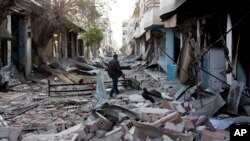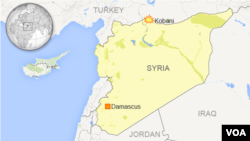A monitoring group said Kurdish fighters took control of the long-besieged Syrian town of Kobani Monday after months of fighting Islamic State militants, though the Pentagon declined to declare the battle over.
The Pentagon says Kurdish fighters now control about 90 percent of the Syrian city of Kobani, denying the Islamic State militants one of their strategic goals.
U.S. Central Command, which leads the international coalition battling Islamic State, congratulated the fighters. They have fought aggressively and with fortitude, it said, and called the loss of Kobani a failure for Islamic State.
The Kurds, backed by U.S. airstikes, fought for control of Kobani from Islamic State for months. The city is on the Syrian-Turkish border. Whoever controls the city also controls a major border crossing.
But much of Kobani is in ruins. Thousands are homeless, said a Kurdish official, and there are no hospitals, water, power or food
The Britain-based Syrian Observatory for Human Rights and senior Kurdish official Idris Nassan said Syrian Kurdish YPG forces and Iraqi Kurdish forces known as peshmerga had retaken Kobani, also known as Ayn al-Arab.
But the U.S. military, which has been carrying out airstrikes on Islamic State militants in the border town, was more cautious in its assessment.
"I am not prepared to say the battle there is won. The battle continues. But as of now, friendly forces ... I believe, have the momentum," said Pentagon spokesman Colonel Steve Warren.
Street-by-street warfare has nearly emptied Kobani of civilians since Islamic State fighters began their offensive in July. The city had become a symbol of the battle against the Sunni Muslim insurgents who captured huge swathes of Iraq and Syria over the past year.
If the Islamic State group had captured Kobani, the group would have had control of a border crossing with Turkey and would have been able to open direct lines between its positions along the border.
Fighting on town's outskirts
Rami Abdel Rahman, director of the Syrian Observatory, told AFP that Kurdish fighters had "expelled all Islamic State fighters from Kobani and have full control of the town."
But "the Kurds are pursuing some jihadists on the eastern outskirts of Kobani, but there is no more fighting inside now,” Rahman said.
The Syrian Observatory said Islamic State fighters planted mines in the city as they fled, forcing YPG fighters to proceed with caution.
Perwer Mohammed Ali, a journalist from Kobani who was at the frontline with the YPG, said, "The entire city is liberated. The clashes will start now in Kobani's villages."
The Islamic State group still has fighters in hundreds of surrounding villages.
The group's spokesman also called on supporters on Monday to target people in the West with whatever weapons they could lay their hands on, as well as praising attacks in Paris, Ottawa and Sydney.
The loss of Kobani raises the question of what the Islamic State group will do next. Analysts said it could put the brakes on Islamic State plans for expansion in Syria.
On September 23, a U.S.-led coalition, formed to fight the spread of the Islamic State group in Iraq, began targeting the group in Syria.
On Monday, the U.S. military said it had launched 21 airstrikes in Syria -- 17 targeting Islamic State positions near Kobani -- and 13 in Iraq over a 24-hour period.
A Combined Joint Task Force statement said the strikes in Iraq hit targets near Mosul, Tal Afar, Haditha and Fallujah.
US airstrikes
More than 80 percent of all coalition airstrikes in Syria have been in or around Kobani, The Associated Press reported.
Kurdish official Nassan said that half of the town had been completely destroyed and much of the rest of it had suffered damage, leaving many homeless. He said the town lacks water, electricity, hospitals and food.
Since mid-September, the battle for Kobani has killed about 1,600 people, including 1,075 Islamic State group members, 459 Kurdish fighters and 32 civilians, the Observatory reported earlier this month.
The Islamic State group, increasingly under pressure, has carried out more than 35 suicide attacks in Kobani in recent weeks, activists say.
Russia hosts Syria talks
Meanwhile, Russia is hosting a Syrian delegation for talks Monday in Moscow as part of a push to relaunch substantive peace talks and find a political resolution to the civil war.
Officials said the goal of the four days of talks is to lay the groundwork for a new peace conference like the two rounds of U.N.-mediated negotiations last year in Geneva. Those talks achieved little progress.
Expectations for the Moscow meetings are low amid a boycott from the main Western-backed opposition and questions about how to negotiate an agreement among the diverse groups fighting the government.
In an interview published Monday by the U.S.-based journal Foreign Affairs, Syrian President Bashar al-Assad said, "Any war ends with a political solution," but discussions must be with a true Syrian opposition and not a "puppet" controlled by Qatar, Saudi Arabia or Western nations.
Assad questioned Western countries describing the existence of a "moderate opposition" in Syria, saying those fighters are really "rebels" who have mostly become part of al-Qaida or rejoined the Syrian army.
Assad's government has long described opposition fighters as "terrorists" and blamed the influence of foreign governments.
In the interview, he accused Turkey, Saudi Arabia and Qatar of going against a U.N. Security Council resolution and supporting Islamic State fighters and the al-Qaida-linked Nusra Front.
Assad levels accusations
Assad further said Turkey is providing a "continuous supply" of new rebels to fight in Syria.
The president also said the Islamic State group has gained more territory since the beginning of U.S.-led airstrikes targeting the militants, calling the U.S. effort "window dressing" instead of real progress that can only come with ground fighting.
What began in March 2011 as peaceful protests against Assad's government has spiraled into a war involving both moderate opposition fighters and Islamic militants battling government forces and each other for territory and influence.
The conflict has left more than 200,000 people dead and forced a huge chunk of the country's population to flee their homes.
Turkey, Lebanon, Jordan, Iraq and Egypt are hosting 3.7 million Syrian refugees, while the United Nations says another 7.6 million people are displaced within Syria.
Some material for this report came from Reuters, AFP and AP.






